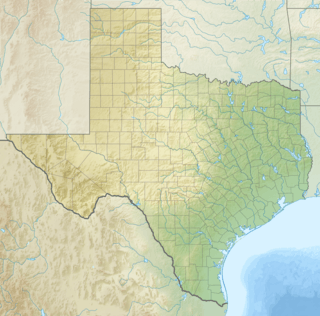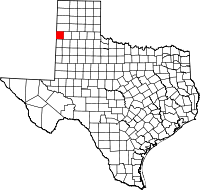Bovina, Texas
| Bovina, Texas | |
|---|---|
| City | |
|
Grain Elevator in Bovina | |
 Bovina | |
| Coordinates: 34°30′49″N 102°52′59″W / 34.51361°N 102.88306°WCoordinates: 34°30′49″N 102°52′59″W / 34.51361°N 102.88306°W[1] | |
| Country |
|
| State |
|
| County | Parmer |
| Region | Llano Estacado |
| Established | 1899 |
| Area | |
| • Total | 1.2 sq mi (3 km2) |
| • Land | 1.2 sq mi (3 km2) |
| • Water | 0.0 sq mi (0 km2) |
| Elevation[1] | 4,068 ft (1,240 m) |
| Population (2010)[2] | |
| • Total | 1,868 |
| • Density | 1,600/sq mi (600/km2) |
| Time zone | CST (UTC-6) |
| • Summer (DST) | CDT (UTC-5) |
| ZIP code | 79009 |
| Area code | 806 |
| Website |
www |
Bovina is a city in Parmer County, Texas, United States. The population was 1,868 at the 2010 census.
History
Originally, the community was the Hay Hook Line Camp of the XIT Ranch, and the ranch headquarters was one of the county's earliest buildings. When the Pecos and Northern Texas Railway was built through the ranch in 1898, a switch was placed at the site to be used by cowboys to unload cottonseed shipped in as feed. Some of this feed was invariably spilled along the tracks, causing XIT cattle to gather at the unfenced right-of-way. Often, they lay down, compelling railroad workers to get off their trains and prod them off the tracks. As a result, the site was labeled Bull Town, a name replaced by the more elegant Bovina when the post office was established on January 31, 1899.[3]
Geography
Bovina is located at 34°30′49″N 102°52′59″W / 34.51361°N 102.88306°W.[1]
According to the United States Census Bureau, the city has a total area of 0.9 square miles (2.3 km2), all of it land.
Demographics
| Historical population | |||
|---|---|---|---|
| Census | Pop. | %± | |
| 1950 | 612 | — | |
| 1960 | 1,029 | 68.1% | |
| 1970 | 1,428 | 38.8% | |
| 1980 | 1,499 | 5.0% | |
| 1990 | 1,549 | 3.3% | |
| 2000 | 1,874 | 21.0% | |
| 2010 | 1,868 | −0.3% | |
| Est. 2016 | 1,777 | [4] | −4.9% |
As of the 2010 United States Census, there were 1,868 people residing in the city. The racial makeup of the city was 82.3% Hispanic or Latino, 16.6% White, 0.7% Black, 0.1% Native American, 0.1% Asian, 0.1% Pacific Islander, 0.1% from some other race and 0.1% from two or more races.
As of the census[6] of 2000, there were 1,874 people, 567 households, and 467 families residing in the city. The population density was 2,161.0 people per square mile (831.7/km²). There were 612 housing units at an average density of 705.7 per square mile (271.6/km²). The racial makeup of the city was 48.67% White, 1.23% African American, 0.69% Native American, 0.21% Pacific Islander, 46.32% from other races, and 2.88% from two or more races. Hispanic or Latino of any race were 72.20% of the population.
There were 567 households out of which 51.5% had children under the age of 18 living with them, 67.0% were married couples living together, 11.5% had a female householder with no husband present, and 17.6% were non-families. 16.4% of all households were made up of individuals and 9.5% had someone living alone who was 65 years of age or older. The average household size was 3.31 and the average family size was 3.72.
In the city, the population was spread out with 37.6% under the age of 18, 9.5% from 18 to 24, 27.9% from 25 to 44, 16.2% from 45 to 64, and 8.8% who were 65 years of age or older. The median age was 28 years. For every 100 females there were 101.1 males. For every 100 females age 18 and over, there were 93.5 males.
The median income for a household in the city was $27,426, and the median income for a family was $29,602. Males had a median income of $25,417 versus $18,036 for females. The per capita income for the city was $10,995. About 16.8% of families and 20.8% of the population were below the poverty line, including 24.0% of those under age 18 and 17.3% of those age 65 or over.
Government
In 1976, Bovina adopted the city manager form of government, with Larry D. Gilley first filling the position. Gilley later became the manager in Abilene and San Marcos, Texas. The last city manager was Ernest Terry, who served from 2001-2007. Terry later became the manager in Fritch, Texas. Currently filling the position as part-time city manager is Jana Pitcock.
Residents
Early in his career, the Texas educator and firefighter Pat Barrett taught agricultural studies at Bovina High School.[7]
Actors Ben and Butch McCain grew up in Bovina.
One of the best-known Bovina residents was John Elmo Sherrill, Jr. (1925–2007), who held four different public offices in Bovina and Parmer County, including Bovina alderman, mayor (1956–1960), school board member, and city judge (1997–2007).
Education
The City of Bovina is served by the Bovina Independent School District.
The high school's mascot is the Mustang. Its colors are maroon and white.
See also
References
- 1 2 3 "Bovina". Geographic Names Information System. United States Geological Survey.
- ↑ "US Gazetteer files: 2010, 2000, and 1990". United States Census Bureau. 2011-02-12. Retrieved 2011-04-23.
- ↑ "Bovina, Texas". Handbook of Texas. Retrieved 7 May 2015.
- ↑ "Population and Housing Unit Estimates". Retrieved June 9, 2017.
- ↑ "Census of Population and Housing". Census.gov. Archived from the original on May 12, 2015. Retrieved June 4, 2015.
- ↑ "American FactFinder". United States Census Bureau. Archived from the original on 2013-09-11. Retrieved 2008-01-31.
- ↑ "Pat Barrett". Lubbock Avalanche-Journal, April 8, 2010. Retrieved April 19, 2010.
External links
| Wikimedia Commons has media related to Bovina, Texas. |
- Bovina,TX from the Handbook of Texas Online
- U.S. Geological Survey Geographic Names Information System: Bovina
- Photos of the Llano Estacado

